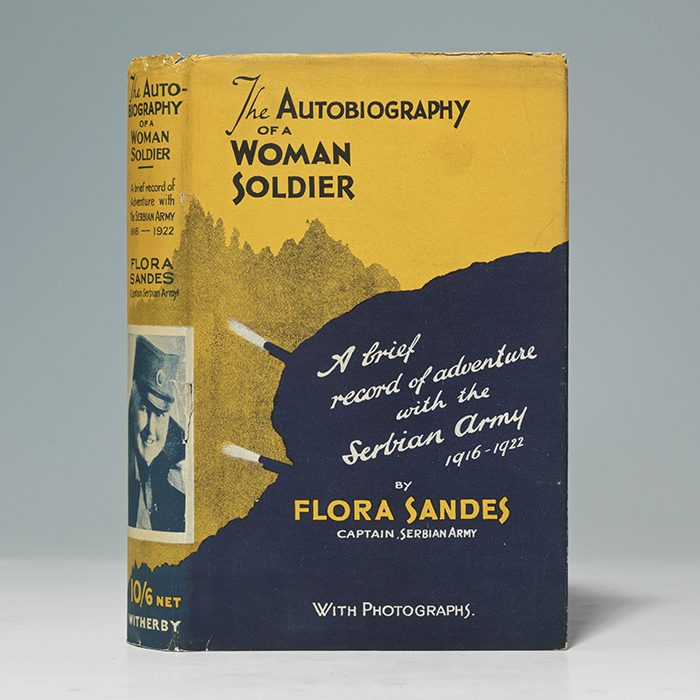
"THE ONLY WESTERN WOMAN TO ENLIST AND GO INTO BATTLE DURING WWI": FIRST EDITION OF FLORA SANDES' AUTOBIOGRAPHY OF A WOMAN SOLDIER, 1927
SANDES, Flora. The Autobiography of a Woman Soldier. A Brief Record of Adventure with the Serbian Army, 1916-1919. London: H.F.& G. Witherby, 1927. Octavo, original blue cloth, original dust jacket. $2200.
First edition of Sandes' fascinating account of fighting in the trenches alongside Serbian soldiers in WWI—"Flora was a fearless woman… she wanted to fight and insisted on going to the front"—featuring frontispiece of Sandes in uniform and seven pages of photographic illustrations, an exceptional copy in the original dust jacket.
To Serbian soldiers in WWI, Flora Sandes was "nashi Engleskinja" ("our Englishwoman"). Born in England of Irish descent, Sandes arrived in Serbia in 1914, where she first worked as a nurse. By late 1915 she had joined a field ambulance unit and that winter, "faced with a choice between being sent home or remaining with the army, Sandes seized her moment. With the approval of her commander, she picked up a rifle and enlisted as a private… two weeks after she joined the army, Sandes got her chance to fight. In so doing, she became the only Western woman to enlist and go into battle during WWI" (Independent). Sandes' biographer Louise Miller notes: "For her, going to war was never really a moral crusade or a political statement about sex equality. She was driven by a love of adventure. Flora was a fearless woman… she wanted to fight and insisted on going to the front" (Express).
Dubbed the "Serbian Joan of Arc," Sandes "lived in the trenches with her comrades, shared their food, slept underneath their overcoats, divided her last cigarettes and crusts of bread with them, and was severely wounded in November 1915 by a Bulgarian bomb. Promoted to sergeant she was wounded again in July 1917 and returned to her unit the following October. She participated in the final offensive against the Austrian and Bulgarian forces and was demobilized on 1922" (ODNB). Awarded the Kara George Star, Serbia's most prestigious award for non-commissioned officers, "she remained in Serbia (later Yugoslavia) after the war, becoming a reserve captain in 1926 and marrying a White Russian refugee… Her courage would come to the fore again in WWII, when she refused to leave her Belgrade home ahead of the Nazi invasion but, instead, pulled on her uniform again at the age of 65 and marched off to fight the Germans. Her old war wounds quickly put paid to this plan, though, and she finished up in a German-run military hospital, from which she escaped by changing into civilian clothes and sauntering out through the front gate" (Independent).
In this Autobiography she writes barely surviving a bombing and the fellow soldier who found her. "Doggedly determined to get my corpse, as he thought it was… he happened to be towing me by my right arm, which was smashed, and I can remember wishing I could tell him to pull me by the other." Later, "I caught the little Sergeant, who had helped carry me, watching me with his eyes full of tears. I assured him that it took a lot to kill me." Published in 1927, she concludes the work with her struggle to return to civilian life. "Turning from a woman into a private soldier proved nothing compared with turning back again from soldier to ordinary woman… My metamorphosis, too, lost me all my old pals… Never again could it be quite the same." Expands on her 1916 work, An English Woman-Sergeant in the Serbian Army, written primarily to raise money for Serbia in the war. Page of publisher's advertisement at rear. Bookplate.
Book fine; light edge-wear, faint soiling to bright near-fine dust jacket.